
Trichophaga tapetzella, the tapestry moth or carpet moth, is a moth of the family Tineidae. It is found worldwide.

Agonopterix ocellana is a species of moth of the family Depressariidae. It is found in Europe and was first described by Johan Christian Fabricius in 1775

Gracillaria syringella is a moth of the family Gracillariidae. It is found in Europe.
Denisia albimaculea is a moth of the family Oecophoridae. It is found in Europe.

Elachista maculicerusella is a moth of the family Elachistidae found in Europe.
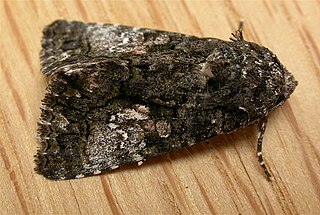
Aedia leucomelas, the eastern alchymist, sweet potato leaf worm or sorcerer, is a moth of the family Noctuidae. It is found in large parts of the world, ranging from Europe all over Asia up to Japan and some African countries. The subspecies Aedia leucomelas acronyctoides is found in Australia.

Spaelotis ravida, the stout dart, is a moth of the family Noctuidae. The species was first described by Michael Denis and Ignaz Schiffermüller in 1775. It is found in the Palearctic realm.
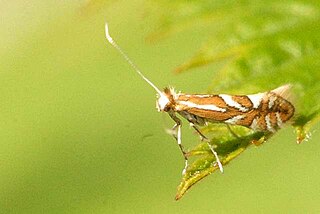
Phyllonorycter oxyacanthae is a moth of the family Gracillariidae. It is found in all of Europe except the Balkan Peninsula.
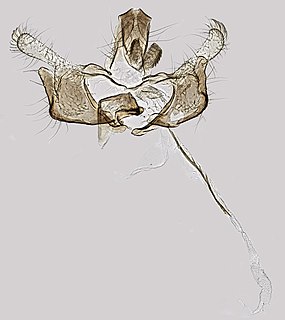
Coleophora betulella is a moth of the family Coleophoridae. It is found in all of Europe, except the Balkan peninsula.

The lobster-clawed moth is a moth of the family Gelechiidae. It is found in most of Europe, except for the Iberian Peninsula and most of the Balkan Peninsula. In the east, the range extends to Siberia and Taiwan.
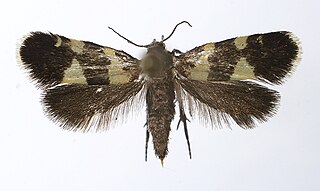
Lampronia luzella is a moth of the family Prodoxidae. It is found in Ireland, Great Britain, the Benelux, France, central Europe, Italy, Fennoscandia, the Baltic region, Russia, Poland, the Czech Republic and Romania.

Schreckensteinia festaliella, the blackberry skeletonizer, is a moth of the family Schreckensteiniidae first described by Jacob Hübner in 1819. It is found in the Palearctic including Europe and has been introduced to North America

Denisia is a genus of the concealer moth family (Oecophoridae). Among these, it belongs to subfamily Oecophorinae. It was originally established as a subgenus of Borkhausenia.

Incurvaria praelatella is a moth of the family Incurvariidae. It is found in all of Europe, except the Iberian Peninsula.

Phyllocnistis unipunctella is a moth of the family Gracillariidae. It is known from all of Europe.

Parornix scoticella is a moth of the family Gracillariidae. It is known from all of Europe.
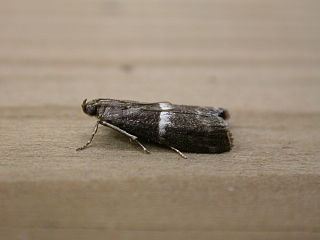
Elegia similella is a moth of the family Pyralidae. It was described by Johann Leopold Theodor Friedrich Zincken in 1818 and is known from most of Europe. The habitat consists of old, mature woodland and parkland.

Caryocolum fraternella is a moth of the family Gelechiidae. It is found in Ireland, Great Britain, Fennoscandia, Denmark, Germany, the Netherlands, France, Switzerland, Spain, Latvia, Estonia and Ukraine.
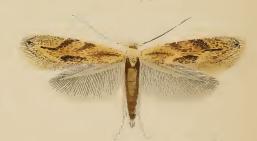
Bucculatrix bechsteinella is a moth of the family Bucculatricidae. It was described by Johann Matthäus Bechstein and Georg Ludwig Scharfenberg in 1805. It is found in most of Europe, except Greece and Bulgaria.

Tinea pallescentella, the large pale clothes moth, is a moth of the family Tineidae. It is found in most of Europe. It is also present in western North America, where it has been recorded from California. There are also records from South America and Australia.
















